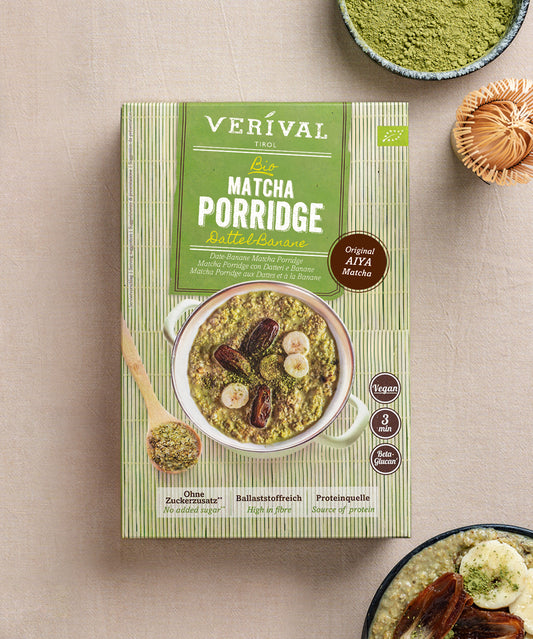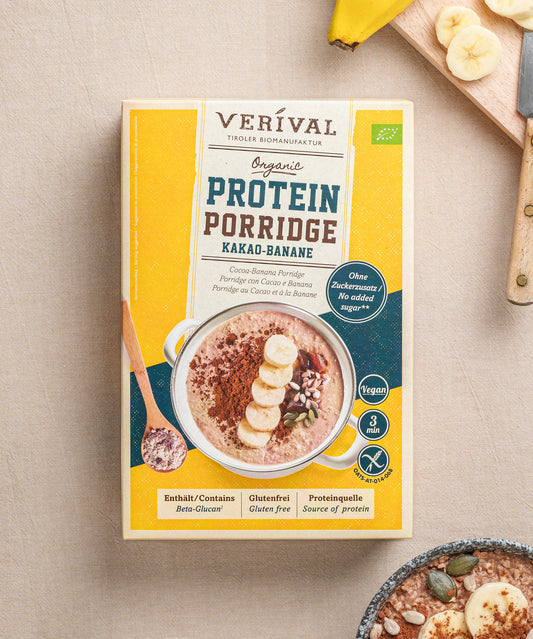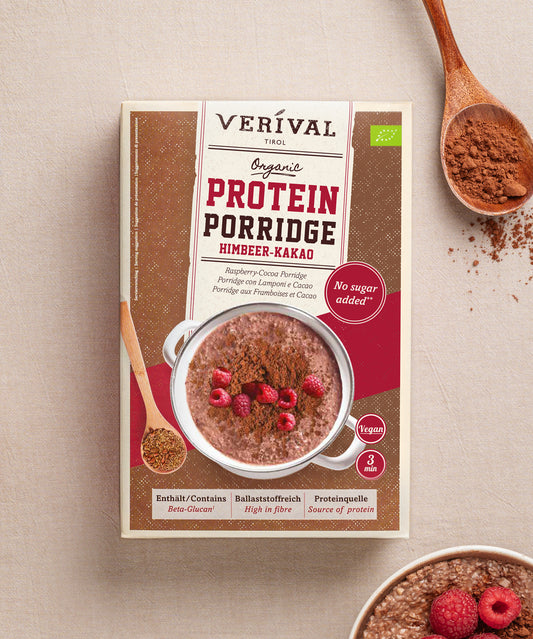Our gut is much more than just a digestive organ. It plays a central role in our immune system, metabolism and general well-being. A healthy gut microbiome is crucial for these processes to function smoothly. An unbalanced diet with lots of sugary foods can disrupt this delicate balance and impair our well-being in the long term.
Try the healthy Verival breakfast with no added sugar
What is the microbiome?
The microbiome comprises all microorganisms that live in and on our body. Most of them are found in the gut. Billions of bacteria, viruses and fungi form a complex ecosystem there that is essential for our health.
These little helpers support digestion, aid in the absorption of nutrients and produce vitamins such as vitamin K and certain B vitamins. They also protect the intestinal mucosa and prevent the spread of disease-causing germs.
Functions of the intestinal flora for digestion, the immune system and metabolism
Around 70 to 80 per cent of immune cells are located in the gut, which shows how important a balanced intestinal flora is for our immune system. It helps the body to recognise pathogens, regulate inflammation and protect the intestinal mucosa. At the same time, important metabolic products such as short-chain fatty acids are produced in the gut, which supply the intestinal mucosa with energy and strengthen the gut's natural barrier.
The gut is also in close communication with the nervous system. Via the so-called gut-brain axis, a stable microbiome influences not only digestion, but also mood and concentration.
Sugar and its effect on the digestive system
Not all sugars are the same. There are different types of sugar, such as glucose, fructose, lactose and sucrose. They are digested and utilised by the body in different ways. Simple sugars enter the bloodstream quickly and cause blood sugar levels to rise rapidly. Complex carbohydrates from wholemeal products, on the other hand, are broken down more slowly and provide energy over a longer period of time.
Excessive sugar consumption can put strain on the digestive system. Rapid absorption leads to sharp fluctuations in blood sugar levels and, in the long term, also changes the composition of the intestinal flora.
Effects of sugar on the intestinal flora
The intestinal flora lives in a delicate balance between beneficial and less beneficial bacteria. If too much sugar is consumed on a regular basis, this balance is disrupted. Sugar serves as food for certain bacteria and yeasts, which can then multiply rapidly. This leads to a decrease in the diversity of good intestinal bacteria and the microbiome develops towards an imbalance.
When unfavourable bacteria and yeasts take over, more metabolic products are produced, which promote inflammatory processes in the gut. This weakens the gut mucosa, which can lead to increased permeability. This change is also known as ‘leaky gut’.
The connection between sugar, leaky gut and irritable bowel syndrome
In a so-called ‘leaky gut’, the intestinal barrier is no longer completely intact. As a result, substances that should normally remain in the intestine can enter the bloodstream, and the immune system often responds with inflammation. As a result, many sufferers report flatulence, abdominal pain, fatigue or skin problems. Irritable bowel symptoms can also intensify, especially if the balance of the intestinal flora is already disturbed.
Consequences for health
When the intestinal flora becomes unbalanced, there are rarely no consequences. The immune system, energy levels and even mood can suffer.
Sugar and the immune system
A weakened intestinal flora can impair the immune system. Studies show, for example, that people with a diverse microbiome are less likely to suffer from infections or chronic inflammation.
Impact on energy, mood and mental health
Sugar can provide short-term energy, but it also leads to a rapid drop in performance. When blood sugar levels drop, we feel tired, irritable and unable to concentrate. In addition, the condition of the gut influences the formation of neurotransmitters such as serotonin. A disturbed microbiome can therefore also have a negative effect on mood.
Sugar and the risk of chronic diseases
A permanently high sugar consumption is associated with numerous diseases. In addition to obesity and diabetes, the role of the gut is also becoming increasingly important. Chronic inflammation in the gut can promote cardiovascular disease, depression or metabolic disorders in the long term.
Reducing sugar for healthy gut flora
An unbalanced diet high in sugar can throw the microbiome out of balance. The good news is that the gut flora can adapt to changes. Reducing sugar consumption and incorporating fibre-rich foods into your daily routine can specifically support gut health.
Recognising sugar traps in everyday life
Many products contain sugar, even if you wouldn't suspect it at first glance. These include ready-made sauces, bread, yoghurt and muesli mixes. Taking a look at the list of ingredients helps to identify hidden sugar.
Natural alternatives for more balance
It's not about completely banning sweets, but about making conscious choices. Products with natural sweetness from fruit can be a good choice. Homemade foods also offer more control over the amount of sugar.
Fibre, prebiotics and probiotics as antagonists
Fibre serves as food for good intestinal bacteria and promotes their growth. It is mainly found in wholemeal products, legumes, linseed and vegetables. On the other hand, prebiotics such as inulin or oligofructose specifically support the growth of beneficial bacteria. Probiotic foods such as yoghurt, kefir or sauerkraut provide live microorganisms that can help restore balance in the gut.
Conclusion – less sugar, more diversity in the gut
Sugar not only affects blood sugar levels, but also the delicate balance of our microbiome. Reducing your sugar consumption and eating fibre-rich, natural foods supports digestion, the immune system and general well-being.
Verival muesli with no added sugar – discover it now
Frequently asked questions
Is sugar bad for the gut flora?
Too much sugar can disrupt the delicate balance of the gut flora. It serves as food for certain bacteria and yeasts, which can then multiply more quickly and displace beneficial gut bacteria. In the long term, high sugar consumption can promote inflammation and weaken the barrier function of the gut.
What destroys the microbiome?
A microbiome loses its balance mainly due to an unbalanced diet with a lot of sugar, highly processed foods and little fibre. Frequent stress, alcohol, certain medications or infections can also affect the diversity of intestinal bacteria. A stable microbiome therefore needs a varied diet and foods that are as natural as possible.
























